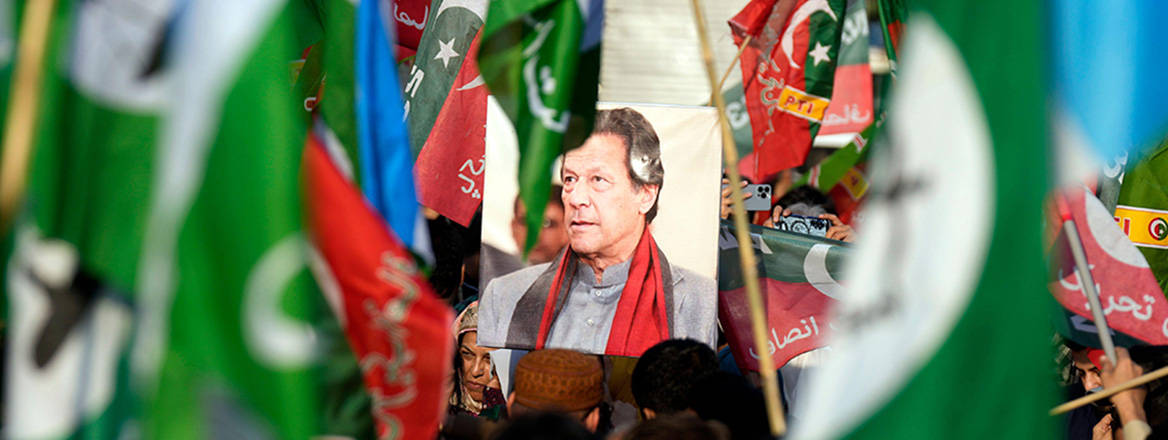Pakistan’s Elections: Washington Should Urge the Army to Respect the People
Despite its leader being in jail, Imran Khan’s party came out on top in Pakistan’s recent elections. While the army may not like the outcome, any attempt to form a government without a popular mandate will only exacerbate Pakistan’s myriad problems.
Many Pakistanis viewed the country’s recent election as the least free and fair in its troubled history. The most popular politician in the country, former cricket star Imran Khan, watched the election from behind bars after receiving convictions for a smorgasbord of crimes – including, just days before the elections, leaking state secrets, corruption and an illegal marriage. Many past leaders of Khan’s party, Tehreek-e-Insaf (PTI), are in hiding. All were forced to run as independents. PTI candidates weren’t allowed to use its well-recognised symbol, a cricket bat, which was potentially devastating given that 40% of eligible voters can’t read. Mobile phone and internet services were suspended on election day, hampering travel to polling stations.
Khan had been prime minister until falling out of favour with the generals and being ousted from office in 2022. His party was banned and all its candidates forced to run as independents.
Despite everything that was thrown at it, candidates affiliated with Khan’s party have won at least 93 seats in parliament – far more than any recognised party. Never before has a party achieved such a result despite being overtly opposed by the army.
Pakistanis understand that the army – known euphemistically as ‘the establishment’ – wanted them to vote for Nawaz Sharif, whose younger brother has been heading the caretaker government. The elder Sharif was previously convicted of corruption after revelations of unexplained wealth in the Panama Papers and banned from political office for life. In October, he returned from four years of self-imposed exile. In parallel, a series of court rulings allowed him to return to political life.
The army is used to calling the shots. No prime minister in Pakistan has ever finished a five-year term. On the other hand, three out of four of Pakistan’s military dictators were able to rule for more than nine years each. The US has been a steadfast backer of these dictators, yet has been strikingly quiet about the removal of elected leaders, including Khan.
While loudly claiming to champion democracy, the US has long showered the Pakistani army with money and often treated it as the only partner in Pakistan worth consulting. From 1979 to 1989, the US – in cooperation with Saudi Arabia and the Pakistani army’s main intelligence agency, the ISI – cultivated a jihadi culture to recruit, motivate and sustain the mujahideen fighting the Soviets in neighbouring Afghanistan. After 2001, the US gave the Pakistani military tens of billions of dollars in exchange for its support in the ‘global war on terror’. In December 2023, Pakistani army chief Asim Munir visited Washington and met not only with Pentagon officials but also with Secretary of State Antony Blinken. When Khan had annoyed the US, Wendy Sherman, US Deputy Secretary of State, visited Pakistan and met with Army Chief General Qamar Javed Bajwa but not with the prime minister.
If the establishment continues to suppress the most popular party in the country, Pakistanis will rightly view the government and its backers as hostile and illegitimate
US policy towards Pakistan can be summed up in two crude lines. One is from Charlie Wilson’s War, a book and film about how the US worked with Pakistani intelligence to defeat the Soviets in Afghanistan but then abandoned Pakistan to deal alone with the Islamist Frankenstein the CIA had helped to spawn: ‘All these things happened, and they were glorious and they changed the world. Then we f***ed up the endgame’. The other, attributed to former US President Franklin D Roosevelt about Nicaragua’s brutal dictator, is that ‘[he] may be a son of a b***, but he’s our son of a b***’.
Pakistan’s population of 240 million people is the fifth largest in the world. It has nuclear weapons. It borders Iran and Afghanistan as well as India, and is awash with transnational terrorist groups. Economically, it is near collapse. Inflation is running at 30%. The government almost defaulted in June 2023 and was bailed out with $3 billion from the IMF. Its debt stands at $100 billion, and it will soon need another infusion of cash, which will require painful economic reforms.
A poll last month by Bloomberg found that Khan is the first choice of Pakistan’s business leaders to revive the economy. Meanwhile, Khan’s top financial adviser, Arif Naqvi, who was slated to become finance minister and was widely touted by many – including US diplomats – as a future prime minister himself, is under house arrest in London and facing extradition to the US on dubious charges of fraud.
If the army’s preferred candidate – Sharif – forms a government, it will lack the popular mandate it needs to address the deep problems that are keeping this enormously important and potentially dynamic country on the brink of meltdown. If the establishment continues to suppress the most popular party in the country, Pakistanis will rightly view the government and its backers as hostile and illegitimate.
Washington is right to remain engaged with the army, but it should urgently throw its support behind rehabilitating the people whom Pakistanis themselves believe in.
The views expressed in this Commentary are the author’s, and do not represent those of RUSI or any other institution.
Have an idea for a Commentary you’d like to write for us? Send a short pitch to commentaries@rusi.org and we’ll get back to you if it fits into our research interests. Full guidelines for contributors can be found here.
WRITTEN BY
Whit Mason
RUSI Associate Fellow, Military Sciences
- Jim McLeanMedia Relations Manager+44 (0)7917 373 069JimMc@rusi.org


